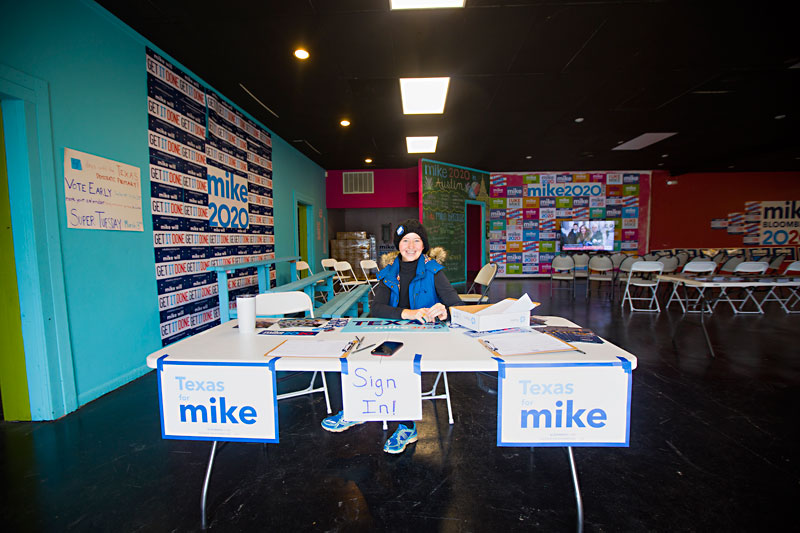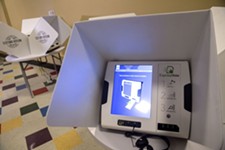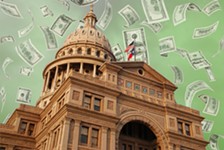How the Democratic Primaries Could Affect Down-Ballot Races in Austin
See what happens when the circus is in town
By Mike Clark-Madison, Fri., Feb. 28, 2020

Throughout a year's escalating hype over Blue Texas 2020, our long-awaited turn in the spotlight as the nation's newest, biggest, and prettiest battleground state, it's been predicted that voter turnout in Democratic strongholds like Austin would be off the charts. Which made the first week of early voting a bit of a letdown – respectable, in line with the new norms established in 2016 and 2018, but not phenomenal.
Yeah, it'll be different in November, with the state's 38 electoral votes, a U.S. Senate seat, multiple U.S. House seats, and control of the Texas House all on the line – and in Austin, five City Council races and a huge rail transit proposal. But next week's (March 3) primary is the first time since 2008 – and before then, nobody can remember – that Texas is poised to play a decisive role in the Democratic presidential contest. (Remember 2008, and the "primacaucus" hybrid system for delegate allocation, and both Clinton and Obama claiming to have won the state? Good times.)
As Texas Democratic Party Executive Director Manny Garcia put it in a Monday press statement, "Texas is more important to Presidential campaigns than ever before and will make or break every viable campaign this cycle. We expect all campaigns to work hard, engage our communities, and earn the vote of working Texans because winning in Texas has now become the pathway to winning the nomination."
In Travis County, the six campaigns left standing indeed appear to be working as hard as they can – a level of effort that varies greatly from one to another – not just to "engage our communities" but to make things clear for a confused electorate that observers feel is waiting until the last minute to decide whether, or how, its votes will matter. That's bound to have an impact on down-ballot races, but what kind of impact is likewise uncertain.
All the Voters in Austin
As is customary, Travis County leads the state in voter engagement – with 95% of eligible voters registered in time for the March 3 primary, according to county voter registrar Bruce Elfant. That's about 821,000 voters. Of course, not all of them are Democrats; Texas doesn't register voters by party, but Hillary Clinton got 66% of the Travis County vote in November 2016, vs. 27% for Trump. So let's say 542,000 Democratic-leaning voters, more or less.
What would constitute the "potential ginormous turnout," to quote campaign consultant Mark Littlefield, that observers have been expecting? The 2016 primary in Travis County (which Clinton narrowly lost to Bernie Sanders) attracted a little more than 145,000 voters; the big dance in 2008 brought out 187,000, and Obama beat Clinton by a 2-1 margin, buoyed by the same sort of wave of new voters that Sanders, especially, is banking on this time.
For a year or more, Littlefield and other consultants have been telling candidates and their backers to plan for well upward of 200,000 votes – some have said as much as 250,000 – to be cast in this primary. "But in the last month, I realized that's not going to happen," he says, "and I think you're seeing it in the early voting data." The first week of early voting saw 28,358 in-person Democratic primary voters, compared to 17,726 in 2016 – a healthy 60% uptick, but out of a registered-voter pool that's more than 20% larger now. More than 97,000 votes were cast early in 2008, when the RV pool was smaller still – an early-vote total we may not match this year. (Though Travis County Clerk Dana DeBeauvoir feels more optimistic; see "Election Ticker")
Early voting accounted for more than half of the total Travis County turnout in the Obama/Clinton 2008 contest, but less than half in the Clinton/Sanders 2016 matchup, and probably a still smaller share this year. "A lot of regular, established Travis County voters aren't sure what to do," says Littlefield, "but the younger voters and the Bernie voters, they definitely know what to do." He points to breakdowns of the first few days of early voting showing voters under 40 keeping pace with, and on some days outvoting, those over 65, which is not typical. Even more notable is the plurality of voters with no prior Democratic primary voting history and an even larger share whose current registration is within the last 24 months.
"Nevada didn't clear anything up, if you're not going to vote for Bernie," Littlefield says, "and South Carolina isn't until after early voting ends." He does expect the usual big boost in early voting numbers in the last three days (through Friday, Feb. 28) and a larger Election Day wave than Travis County has become accustomed to. "But every day you don't vote early, the chance that you cast a ballot at all goes down. The lines get longer, and people will decide they just want us to tell them what to do in November; they're tired of thinking about it, and it causes too much anxiety."
Everybody But Bernie
The presidential campaigns themselves are pushing to avoid that fate, as Sanders' forces seek to seal the deal in Texas (the Vermont senator was expected to lead the pack in Travis County even before his Nevada surge), Mike Bloomberg pushes to translate his unprecedented campaign spending into Super Tuesday success, and the other campaigns simply try to stay alive. Joe Biden, who still appears within striking distance of Sanders, is focusing on more fruitful terrain in Dallas and Houston, while Amy Klobuchar is making stops in Oklahoma and Arkansas but (as of this writing) not in Texas. Neither has much of a ground game in Austin.

The other campaigns on the bubble are outwardly happy with the state of their organizing in Central Texas. Pete Buttigieg has about 2,300 volunteers in the state, of whom "about three-quarters are active volunteers," grassroots organizer Ashley Simon told me at a weekend phone bank. Team Pete doesn't have an office here and only recently got paid staffers into Texas, relying instead on pop-up events (the Saturday phone-a-thon was in a vacant office space at University Park) and the campaign's "relational organizing" model – that is, talking to your friends and networks about Buttigieg rather than knocking on doors and cold-calling strangers.
"It's very one to one; a lot of people are going to be visiting communities that they know, their neighbors or friends or friends of friends," Simon says. "They're staying in places where they know their word will go further. I try to at least reach out to 10 people a day, whether that's somebody in my office or somebody on Facebook, or a friend or family member – just to talk about where they are in their political journey."
Supporters, volunteers, and "the Pete-curious" include people who haven't been involved in politics before, as well as Republicans and people also looking at Biden, Klobuchar, or Elizabeth Warren. Are they mobilized – or troubled – by Buttigieg's most prominent Austin supporter and surrogate, Mayor Steve Adler? "The communities I'm involved in, at least, are really respectful of the direction that Austin is going in, and of all the goals that Mayor Adler has set out," Simon says. "And whether or not you support the things that he does, he's very effective."
While the Buttigieg campaign is now pivoting quickly toward Austin and Texas, Warren's had staffers here since last summer; now, according to campaign spokesperson Alexis Krieg, "We are organizing everywhere – canvassing and phone banking from Downtown, to the suburbs, and even rural areas, with pop-up offices all over Austin, as well as in Round Rock, Manor, Kyle, and Killeen. We have over 650 volunteers in Austin alone who've knocked on doors or made calls, with more joining our team every day."
Warren is unique among the presidential contenders in having actually lived in Austin, during her years as a UT professor (when she first began her research on bankruptcy that made her academic reputation and, she's said since, sparked her transition from Republican to Democrat). Krieg says "People identify strongly with her roots in the state, as well as her vision for the country." That may be even more true down the road in San Antonio, where Warren's own top supporter and surrogate, former candidate Julián Castro, and his family (brother Joaquin the congressman and mother Rosie) have "gone above and beyond to support Elizabeth, reaching out to voters in the state and all across the country."
As is now widely known, Bloomberg's free spending of a small bit of his enormous fortune on his 2020 run has gone not just to his inescapable TV and digital ad buys – including, just last weekend, one featuring Travis County Commissioner Jeff Travillion – but also to paying a bunch of staffers at generous rates. The former New York mayor has 19 field offices in Texas "engaging with voters typically left out of the primary process," says spokesperson Elizabeth Lewis; that includes two in Austin and one in San Marcos.
Although Bloomberg doesn't accept outside donations, he does have volunteers who form "the most robust ground organization of any 2020 presidential candidate." Having bypassed the early states to make his big bet on Super Tuesday, Bloomberg has already been to Texas six times to rally his troops and has rolled out a long list of 101 in-state endorsers, including Houston Mayor Sylvester Turner and retired basketball legend Tim Duncan, who's also stumping for Bloomberg in his native US Virgin Islands, site of the very last nominating contest in June. The campaign's "Get It Done Express" bus tour to turn out early voters swung through Austin on Monday, Feb. 24.
Who Will Turnout Help?
And that leaves Sanders, who drew more than 12,000 people to his Sunday afternoon rally at Vic Mathias Shores (see "Democratic Frontrunner Bernie Sanders Energizes Crowd at Austin Rally"); other campaign events, such as the weekend Austin Bands for Bernie showcase at Empire Control Room (see "Faster Than Sound: Austin Bands for Bernie") and his office opening a few days earlier in far East Austin, have likewise been thronged. Volunteers say Team Bernie has focused special attention on Eastside canvassing in both Spanish and English – very on-brand for the candidate, and a strategy that appears to have helped "Tio Bernie" rack up delegates in Nevada, but one that's not been as effective as hoped for previous Travis County candidates.
More broadly, the jury is still out on whether turning out newer, less frequent, or less traditional voters is going to make a big difference for Sanders in an area where he's expected to do well anyway. Texas allocates its national delegates both statewide and by state Senate district (not by Congressional district, as is the case everywhere else; it's state law), and SD-14, soon to be vacated by Kirk Watson, has the most delegates (10) up for grabs because Austin has the most Democrats. While Biden, Bloomberg, Warren and Buttigieg all have a shot at claiming one or two of the 10, Sanders is expected to garner at least four or five. (Polling released Tuesday night by Rice University's Mark Jones showed neither Bloomberg nor Buttigieg poised to clear the 15% threshhold for candidate viability in SD-14, but things can change.)
What a surge of younger, newer voters, of whatever size, does for everyone else on the ballot is a more interesting proposition. Presumably, the better Sanders does, the better more explicitly Sanders-aligned candidates do down-ballot – Mike Siegel in CD-10, Heidi Sloan in CD-25, José Garza (endorsed by both Sanders and Warren) in the district attorney race, and Delia Garza and Dominic Selvera in the county attorney race.
However, except in Sloan's head-to-head race against Julie Oliver, that Sanders surge may simply mean those candidates end up in a runoff with more centrist contenders, and as Littlefield notes, that's an entirely different box of ballots. "It'll be a different election in a different country in a different time," he says, with turnout "about a third or a quarter what it was in March, much older and much whiter." That is, if the turnout generated by enthusiasm for Bernie or any other presidential candidate translates into down-ballot votes at all; past presidential cycles have seen tens of thousands of undervotes in those races, an effect that's more pronounced in precincts with more new voters, young voters, and voters of color.
Anecdotally, voters have reported that the new machines being used by Travis County make it more difficult to undervote, and even though a consensus has emerged that the new systems are easier to use, they are unfamiliar to many voters, so they will take longer, so lines will be longer. For campaigns who've carefully spent their budgets and planned their media and field programs to get out their best voters, any potential snafus at the polls – exacerbated by heavy election-day turnout – could be catastrophic.
If turnout does manage to approach or surpass 200,000 votes, campaigns will "hopefully have had enough money to do a little TV and a lot of digital to get their message across," says Littlefield. "Smart campaigns will be making sure they have a presence in the traditional high-turnout boxes, but also among voters who registered for the first time in the last 24 to 36 months, just to make sure they know who's running and who's been endorsed by the Democratic clubs or the Chronicle."
Got something to say? The Chronicle welcomes opinion pieces on any topic from the community. Submit yours now at austinchronicle.com/opinion.












